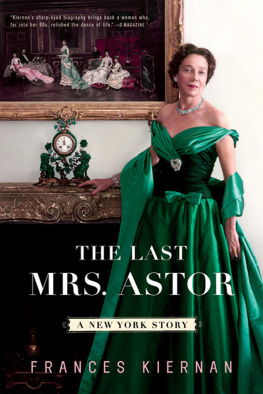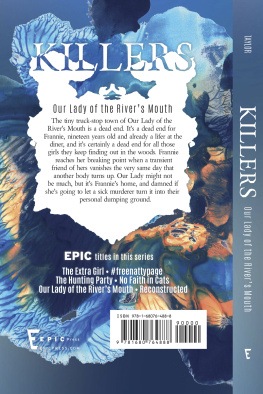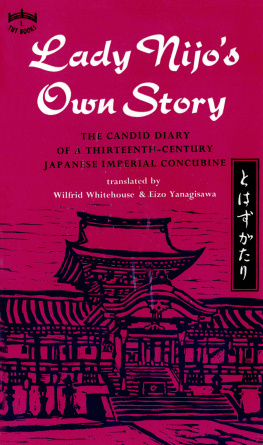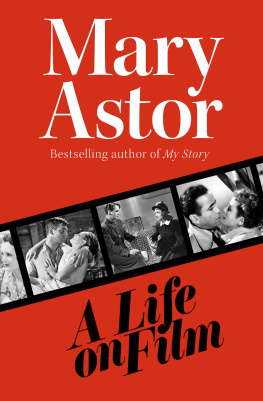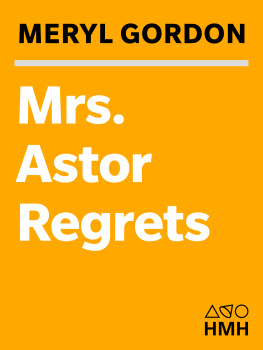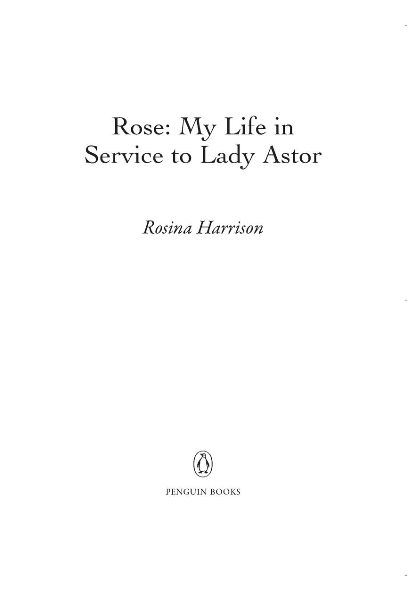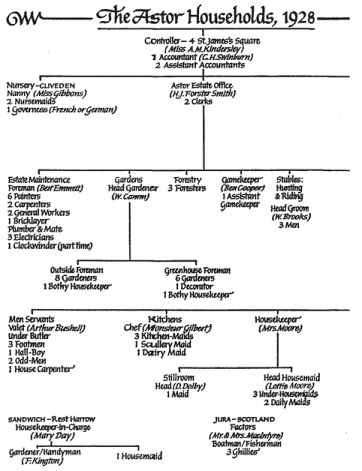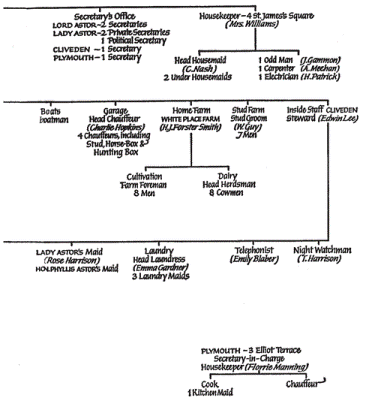Table of Contents
PENGUIN BOOKS
ROSE: MY LIFE IN SERVICE TO LADY ASTOR
Rosina Harrison (known as Rose) was born in Aldfield, North Yorkshire, in 1899. Her mother was a laundry maid and her father a stonemason. Rose went into service 1918, and she was later ladys maid to Lady Astor for thirty-five years. She retired to Worthing where she died in 1989.
To Leigh Reggie Crutchley,
who made it possible
Foreword
Although this book is about domestic service it is also about people, and apart from myself about one person in particular: Nancy, Lady Astor. There have been others who have written of my ladys personal and political life. Some have spoken highly of her, others have been savagely critical. I am not like any of them. To begin with I havent the use of words that they have, nor have I their education or their kind of background, so I have kept away from the parts of Lady Astors life that I was not able to understand and have written about those that I could. This may have given an uneven portrait of her, but everyone has to write from a position and mine was at least one that kept me in contact with her every day for thirty-five years. There were times and places where I was not able to observe her closely and to tell of these I have had to rely on the memories of those of her staff who were present. Always though they have been the servants views of her, not the opinions of associates and friends in her own class.
My life with my lady was one of constant conflict and challenge, and despite occasional wounds on both sides, one that we enjoyed hugely. Although divided by rank and money we had similar natures and I think it is true to say that we always respected each other. I hope my writing will cause no hurt to anyone. None is intended and the last thing I wish to do is to spoil the image of a lady who over the years became the expression of my own life. Whatever else it is, this book is the truth as I saw it.
I am grateful to so many people for helping me to prepare it. To Cyril Price; to Frank and Ronald Lucas of Walton-on-Thames, to Edwin Lee, Charles Dean, Frank Copcutt, Noel Wiseman and Gordon Grimmett, who have filled in the gaps; to my sisters Olive and Ann, who always had faith and so gave me courage; to Desmond Elliott, my agent, Michael Legat, my publisher, and Mary Griffith, my editor; to Jenny Boreham, who typed and retyped with unflagging energy, and finally to Leigh Reggie Crutchley, to whom I dedicate this book.
Childhood
I was born in 1899 in a pretty little village, Aldfield, near Ripon in Yorkshire. Its very near that famous old ruin Fountains Abbey. The village and the land surrounding it were owned then by the Marquess of Ripon who lived at Studley Royal. I suppose, though I was never conscious of it, that he dominated our lives and those of everybody who lived on his estate from the farmers downwards. He was a kind of benevolent dictator. The men would touch their forelocks or doff their caps to him and to her ladyship and the women would curtsy. It wouldnt have done to have offended him in the slightest way, but speaking for our family this was unlikely; we knew our place. By that I dont mean that we were subservient. Knowing your place was a kind of code of behaviour at that time and we followed it to the letter. In any case there wasnt time to think about the rights and wrongs of it; people were all too busy working and bringing up a family for that.
My father was employed as a stonemason by the Marquess of Ripon. It was a skilled trade, fashioning the stones or slates and repairing buildings on the estate. He also helped to preserve Fountains Abbey. His wage was 1 a week. He was also sexton and caretaker for our church at Aldfield and the one at Studley. This brought in another thirty shillings a year and it was augmented when there were weddings or funerals. He was also the gravedigger and earned a few extra shillings by tending the graves, weeding them and seeing to the flowers. He even made a little more in the summer by scything the grass in the churchyard, stooking it into a small hayrick and selling it to a nearby farmer.
Before she married, my mother was laundrymaid at Tranby Croft and Studley Royal which was how she met my father. They must have been pleased with her work at the big house because when Dad and she set up home together she continued to do the household and personal laundry for the Marquess and Marchioness at our home. Clothes! I grew up hating the sight of them. The only time our kitchen was free of them was on Saturdays and Sundays. I must have seen more of ladies and gentlemens underwear than was good for me by the time I left home. We only saw the fire at weekends or when we were baking or cooking; at all other times there would be a clothes-horse surrounding it. Dad used to complain but he knew there was really no use his grumbling, it brought in the extra money that was so necessary. I never knew how much and I dont think Dad did, but Mum always seemed to have what was needed in a crisis.
There were four of us children: I was the eldest, then came my brother Francis William and sisters Suzanne and Olive, all at two-yearly intervals. I was christened Rosina, but since this was bound to be abbreviated to Rose, my mothers name, and since she was not going to have the distinction of Old Rose, I have always been called Ena by my family. Its the sort of situation that should have been thought about before I was christened, as it has caused a lot of confusion and irritation during my life.
People have often said to me how lucky I was to be brought up in a village in the beautiful countryside with the freedom of the fields and lanes, the simplicity of life among animals and above all in peace. It sounds lyrical as I write it and perhaps in a way it was, but people forget and sometimes I do that for the most part life was continual hard work even as a young child. From the time any of us can first remember we had to play our part in the running of the house. Mum and I would get up before six every morning. Dad had to set off for work at half-past. He walked to the lodge at Fountains Abbey to get his orders from the foreman and be told where he had to go to for the day. At one time he cycled but he had been struck by lightning which made him too nervous to ride a bicycle ever again.
My first job was to lay the kindling wood and to get the fire going. We burnt logs which Dad and I had to cut with a cross-cut saw from a load of timber he bought off the estate. We didnt use coal; it wasnt necessary and it cost money. Even the baking was done with wood, thin pieces cut to size which we poked under the oven to get it to the right heat. Then there was the water to be fetched in buckets from the pump outside or, if it was a fine summer and the well there had dried up, from the one farther down in the village. The small boiler in the fireplace had to be filled. This and the kettle were the only supplies of constant hot water. After that I helped Mum get Dads breakfast and of course there were my brother and sisters to be got up, helped with their dressing and generally hurried up and shouted at.
It was a relief to get to school. I enjoyed learning. The building was typical of the time. There were two classrooms and we were taught by the headmaster and his wife, a Mr and Mrs Lister, just the three Rs with a little geography, history, art and, for the girls, sewing and embroidery. Opposite the school there was a field where we used to play football. I used to keep goal at one end and Mr Lister at the other. I loved it. Apart from the fact that I was good at it and very few balls got past me, it gave me the opportunity to use my voice. Id scream encouragement and advice from beginning to end of the game and I could be heard all over the village. When I went home my mum would be angry with me and tell me off about my unladylike behaviour. It didnt make any difference Id be at it again the next time. The game used to take the toes out of my shoes so eventually Mum made me wear clogs. I didnt mind, it was after all true Yorkshire footwear. I remember once being dressed in a lovely little bolero with a wide skirt and with orders to take great care of them. I couldnt resist playing football and I caught my foot in the hem of the skirt and nearly tore it away. I didnt dare go back home for Mum to see so I went into the schoolhouse and together Mrs Lister and I sewed it back again.



